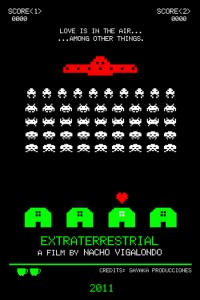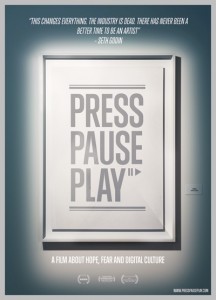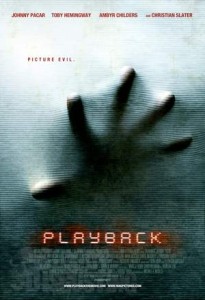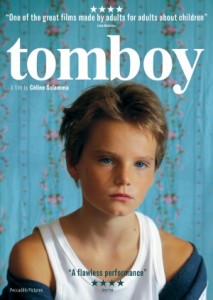
Extraterrestrial

Plot: Julio (Julian Villagran) wakes up in the apartment of Julia (Michelle Jenner) after a one night stand. Before the two can cope with that, they discover they have bigger issues at hand. Extraterrestrials have invaded Earth and have wiped out most of their district. The only two that remain are Carlos, (Raul Cimas), her boyfriend and Angel (Carlos Areces), her annoying and obsessive neighbor. They all work together to survive, while Julia and Julio fight with their feelings for one another.
Review: “Extraterrestrial” reminded me a lot of “Shaun of the Dead”. Both films center around otherworldly activities (zombies for “Shaun”, aliens for this), but are more focused on the characters involved. Both can be viewed as romantic comedies, as love is the basis of each one. Both could work without the supplementary creatures. Most of all, both are wildly entertaining!
Out of the two, “Shaun of the Dead” is funnier and more rewatchable. I think it was unfair of me to compare Nacho Vigalondo’s latest to Edgar Wright’s modern classic. “Extraterrestrial” isn’t trying to be a carbon copy of “Shaun”, nor does it even come close to being so. I just felt there was a connection between the two due to similar themes and strong characters that a comparison was in order.
I should have started by stating that “Extraterrestrial” is a cleverly written, well acted and superbly directed little film that takes a now common theme, an alien invasion, and slightly turns it on it’s head. All that was needed was to focus more on the people affected by the incursion and the plot feels fresh. Not that Nacho heavily focuses on said invasion. It plays a pivotal role in almost every move the characters make and brings them closer together. However, it’s not beaten over the viewers head and isn’t resolved by the closing credits (one of the film’s few problems).
What’s nice about the characters is that they’re all likable. Well, Angel isn’t, but he’s not meant to be. The remaining three are, which was a surprise. I expected Julia and Julio to be destined for one another and for Carlos to be her asshole boyfriend that gets in the way. On the contrary. Carlos is a generally nice fellow who allows Julio to stay with them as opposed to facing the extraterrestrials. He never once gets suspicious of the two and they both show remorse for their actions. Not to go into spoilers, but there’s a scene near the end where Julia and Julia have a breakthrough thanks to an action of Carlos’. It’s sweet and realistic, something in which doesn’t appear often in films such as this. Usually, the two characters we’re supposed to root for have no emotional hurdles to jump over; just imaginary dilemmas.
It’s because of these strong characters and actors that the film works so well! I became heavily invested in their situation and found myself not only rooting for Julia and Julio to get together, but for Carlos to work things out for himself as well. It’s a weird love triangle that hooks the audience and makes them question who exactly is in the right. All the while, the alien invasion is occurring and drastically affecting their decisions. It would have been easy for this to get in the way (or vice versa), but Nacho keeps a tight grip and balances them out! He took a risky move and it paid off!
Final Rating: A-
PressPausePlay

Plot: David Dworsky and Victor Kohler examine the impact that the digital age has had on artists and the industry. It showcases individuals with a creative spark and how they’ve crafted a small skill into a respectable showing worldwide. They also look into the future and predict how the digital age will play into effect further down the road.
Review: Somewhere along the lines, “PressPausePlay” stopped being about the digital age of artistry itself and focused solely on the music aspect of it. Not that this is a huge complaint, as music is one of the bigger factors to come from the internet playground. Even the title itself refers to an mP3 player’s actions. However, the music scene isn’t the only one affected by the internet.
Dworsky and Kohler do examine the other cultures, such as film, painting and writing. They’re only given a small nugget of time to explain their story, thus losing the impact they were trying to proclaim. I felt sorry for the film director who was trying to tell her story, only to be constantly cut off for another segment on the music scene. It almost felt like a slap to the face to her.
I’d be more forgiving if more information was carved form the music scene. The first forty minutes of the documentary are excellent! All parties seem to be given a fair shake and we’re learning of the impact the internet has had on artistry. We even hear from some naysayers, giving the audience a chance to debate on whether this newfound freedom is all that it’s cracked up to be. Then, the film slumps down and focuses almost solely on the music industry and how it’s dead. We get a few interviews with underground musicians, executives and producers and some concert footage. A quick mention of other outlets is brought up, only to be shoved to the side.
This is where the film falls apart. It gets stuck on repeat and numbs the audience with the same information. There’s so much more left to be discussed, but Dworsky and Kohler don’t want to touch it. Maybe it’s possible this should have been a mini-series. Each episode would have looked at a faucet of the industry (i.e. film, music, writing) and dissected the internet’s impact on it. That way, more information could have been extracted and the message would have been clearer. Here, he gets muddled due to creative choices.
Final Rating: C+
Playback

Plot: Julian Miller (Johnny Pacar, looking like the love child of Martin Short and Alan Cumming) is doing research for a school project on Harlan Diehl. Harlan murdered his family and captured it on film. When the group of teens dig further into the story, they unlock an evil that could end their lives.
Review: For every good that “Playback” does, there’s an equal negative just around the corner. Writer/Director Michael A. Nickles crafts an intriguing premise (the evil contained in video being able to possess those who watch it), but doesn’t fully expound on it. That’s not to say he doesn’t give it a concerted effort. It’s just that his explanation(s) are flimsy. They don’t entirely make much sense and the twists tend to contradict each other at points.
An issue as major as this would normally sink a film. However, “Playback” is still mildly enjoyable. This may sound like faint praise, but I assure you it’s not (necessarily). I’ve sat through many films where the hook itself fell flat on it’s face and had me rolling my eyes the entire time. Despite his shortcomings, Nickles was at least able to keep my interest for the duration of the film.
If anything, major credit needs to go to him for making the first half of the film engrossing. While I was still confused with the video’s power, I found myself interested on how it would all play out. I stopped trying to find the logic in the scenario and let the actions speak for themselves. And, for the most part, those actions are enthralling (and rather gory).
It also helps that the acting is superlative! The only seasoned pro on the set is Christian Slater, who plays a sleazy cop quite well. He may be simply picking up another paycheck, but he’s better here than he was in “El Gringo”. The rest of the cast includes young upstarts whose credits mostly include television dramas. Not all of them have much to do outside of looking pretty, but they do so well and never got on my nerves. The only two with weight on their shoulders are Johnny Pacar as Julian, who is charismatic and commands the screen, and Toby Hemingway, who plays the quiet and creepy Quinn. For someone with such good looks, he convinced me he was an outsider. Why is he wallowing in mid-grade productions while Rooney Mara gets to work with David Fincher?
Once the finale kicks in and the big twist applies, the film really falls apart. It becomes formulaic and baffling, nearly causing me to drop the grade down. Once I stopped and thought of the film as a whole, I decided to be fair and give this a mildly positive review. “Playback” may have it’s fair share of problems, but it kept me hooked up until the finale.
Final Rating: B-
Tomboy

Plot: Laure (Zoe Heran) is tired of being a girl. When she and her family have to move once again, she adopts the new moniker or Mickael and pretends to be a boy. Things get complicated when Lisa (Jeanne Disson) falls for her and the two begin dating. As the new school year closes in, Laure has to own up to her charade and face the consequences.
Review: Celine Sciamma takes a more gentle and innocent approach with “Tomboy”. This works well considering the film is seen through the eyes of a ten-year-old girl. Therefore, there’s nothing technically wrong with the direction of the film. If anything, one could argue there isn’t much wrong with the movie at all. It’s well directed, finely acted and has a sweet core to it.
Yet, I wasn’t fully on board with the film. I liked it, no doubt. But, I wanted more from it. In order to attain this, the film would have had to have been longer and explored Laure’s gender issue (so to speak) well into her teens. Though there are dilemmas that are dealt with in the film, most are easily taken care of due to Laure’s age. It’s not highly uncommon for a little girl to want to be a boy and vice versa. It’s a curiosity we all face at one point in our lives, even if we don’t want to admit. For most of us, it comes and goes in a flash, usually at a young age. For others, like Laure, the fascination overtakes them.
In her case, she’s in a new town and can take on the role of Mickael with ease. Having not hit puberty yet, it’s very easy for her to pass off as a boy (there were a few times while watching this that I was convinced it was a male actor playing the part, which was not the case). Take away the makeup and dresses and voila, you have a boy! Once puberty sits in, it becomes more complicated.
Which is why I feel the film should have progressed into her teenage years. That way the issues she’s dealing with would feel more impact. There’s a clear message here about society and how we have to fit into it’s mold, whether or not we feel comfortable with that. It never fully takes off and strikes as hard as it should due to the film’s approach. You can only go so far when dealing with the innocence of a child.
Another dilemma Laure faces is starting a relationship with Lisa. Both girls are now tasked in dealing with a huge sexual orientation quandary. Since they’re ten, this can be easily resolved. There’s still an issue at hand and it must be dealt with (and it is), but it can be brushed aside relatively quickly. By having the two of them grow into teenagers and face these feelings alongside their newfound puberty makes for a much more impactful story.
As I said, “Tomboy” isn’t a bad film. It’s a good film, but it could be great if it took more risks. Considering the age of the character, Sciamma can only go so far in taking risks. That’s why the film should have progressed into her teen years. By not doing so, it leaves “Tomboy” to feel like a cute film. Nothing more, nothing less.
Final Rating: B-
Wild Bill

Plot: Bill (Charlie Creed-Miles) is out on parole after serving eight years in prison. He returns home to find his two sons, Dean (Will Poulter) and Jimmy (Sammy Williams), have been abandoned by their mother. Despite not wanting the responsibility, he takes custody of the boys (who don’t want him around) and stave off Terry (Leo Gregory), a drug dealer who’s trying to rope him back into the field.
Review: People complain a lot about formulas and clichés in film. They feel that films have become unoriginal and stale simply because they follow a certain guideline. Though this can be true in some cases, it’s not the fact that they’re following a blueprint that makes them feel musty. They’re simply not following it well enough.
Take “Wild Bill” for example. It follows a very basic formula. Lowlife criminal comes home to find his two sons in desperate need of parental guidance. He’s reluctant at first, but does so in order to save himself (in this case, his son Dean will rat him out about dealing again if he doesn’t prove to child services that Dean and Jimmy don’t need to go into foster care). As the film progresses, he begins to care for his children and become more selfless. He even falls in love with a hooker, Roxy (Liz White), while trying to give his son relationship advice on Steph (Charlotte Spencer).
I can guarantee you’ve seen that film at least once in your life. Even if you only watch movies once in a blue moon, it’s bound to have popped up. It’s a common story and “Wild Bill” doesn’t break any new ground with it. Yet, I still found myself enthralled in the story and caring about what happened to the characters. Were some of the scenes telegraphed and played out? Sure! Others worked, however, and the performances themselves held the film up.
That’s the real reason to check out “Wild Bill”. The performances are extremely strong and hard hitting! Charlie Creed-Miles is exceptional as Bill! Despite his character going through the motions, I found myself rooting for him to succeed and actually bought his change of heart. Outperforming him to my surprise was the young Will Poulter, who gives a breakthrough performance as Dean. He handles the drama like a pro and tugged at my heartstrings quite a bit. I felt for his character as he struggled with a construction job solely to help raise his younger brother. When his father returned to his life, I connected with his disdain and never felt as if he was acting like a spoiled child.
Even if you feel this one is worth skipping due to the story alone, I highly advise you to check it out for these performances (as well as appearances from Andy Serkis and Olivia Williams). I won’t promise you that you’ll be shaken to your core (you won’t). I won’t even promise you that you’ll see anything new (you won’t). What I can promise you that you’ll given standup performances and solid direction and writing from Dexter Fletcher!
Final Rating: B
